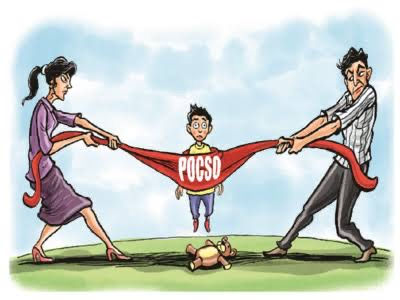Protecting Children, or Policing Desire?
- Esha Mariya

- Sep 3, 2025
- 3 min read
The love laws in this country have always been broken—twisted by caste, controlled by family, and denied by the State. The fundamental freedom to marry, even as adults, is still contested ground, scarred with ‘honour’ killings, runaway petitions, and courts caught between tradition and autonomy.

Now, the very law meant to protect vulnerable children, the POCSO Act, has been turned into a weapon against adolescent love. What was supposed to be a shield is increasingly used as an instrument of control. When a kiss becomes a crime and a crush lands someone in jail, the line between protecting minors and policing desire all but disappears.
In May 2025, the Supreme Court issued an unusually pointed reminder: the Protection of Children from Sexual Offences (POCSO) Act was never designed to criminalize consensual teenage relationships. The bench urged the government to revisit the law’s blanket ban on sexual activity under 18, recommending education, awareness, and nuanced safeguards instead of outright punishment.
It acknowledged what lawyers, activists, and adolescents already knew: POCSO’s rigid treatment of anyone under 18 as incapable of consent risks criminalising relationships between teenagers. Not every adolescent kiss is a crime, and not every teenage romance is predation. Punishing affection instead of tackling exploitation serves no one.
Across India, courtrooms and police stations tell the same story. A boy and girl, often just a year or two apart in age, meet in school or through friends. They fall in love—sometimes quietly, sometimes defiantly. Families disapprove. The girl is pulled home, her phone confiscated, and the boy suddenly faces a police complaint for ‘rape’ under POCSO. Overnight, a teenage romance becomes a criminal case.
The consequences are brutal. In Nagpur, a 17-year-old boy spent months in detention after his girlfriend’s parents, opposed to their inter-caste relationship, filed a POCSO complaint. In Uttarakhand, the High Court intervened in cases where minor boys were being arrested for going on dates.
These cases destroy not just young love but entire futures. Accused boys spend months in jail awaiting bail, lose access to education, and are stigmatized as predators. Even acquittal cannot erase the shadow of school records, job rejections, and whispered reputations. For girls, too, the damage is profound. Their agency is erased, their voices sidelined in the name of protection.
The problem lies in POCSO’s strict threshold: anyone under 18 is legally incapable of consent. This zero-tolerance stance leaves no space to distinguish between consensual adolescent relationships and genuine abuse.
On the ground, the law has become a tool of parental control. Parents frequently deploy it against relationships that cross caste, class, or religious boundaries. Police rarely examine the dynamics—once a complaint is filed, prosecution is almost automatic. Judges may sympathize, but until the law changes, their hands remain tied.
The Law Commission’s 283rd Report (2023) acknowledged this problem but refused to lower the age of consent, citing risks of child marriage, trafficking, and exploitation. Instead, it recommended limited judicial discretion when both parties are between 16 and 18 and in a consensual relationship. In 2025, the Union government echoed this view: the age of consent cannot be reduced, but courts may differentiate between teenage romance and abuse.
While progressive in tone, these recommendations have not translated into actual reform. Political will is scarce. After all, defending teenage love is hardly a vote-winning issue in a deeply conservative society.
The irony is bitter. The law meant to protect children from predators is now punishing them for desire. Instead of empowering young people to resist abuse, it silences them when their choices clash with family expectations. Real predators slip through the cracks, while adolescents are dragged into courtrooms.
Love is a fundamental human experience, and adolescents, too, have the right to form emotional connections. In a society where love is filtered through caste, class, and religion, teenage romance is not just youthful—it is political. And when two young people dare to cross those invisible lines, the law is too often ready to uphold the very prejudices it should dismantle.







Comments